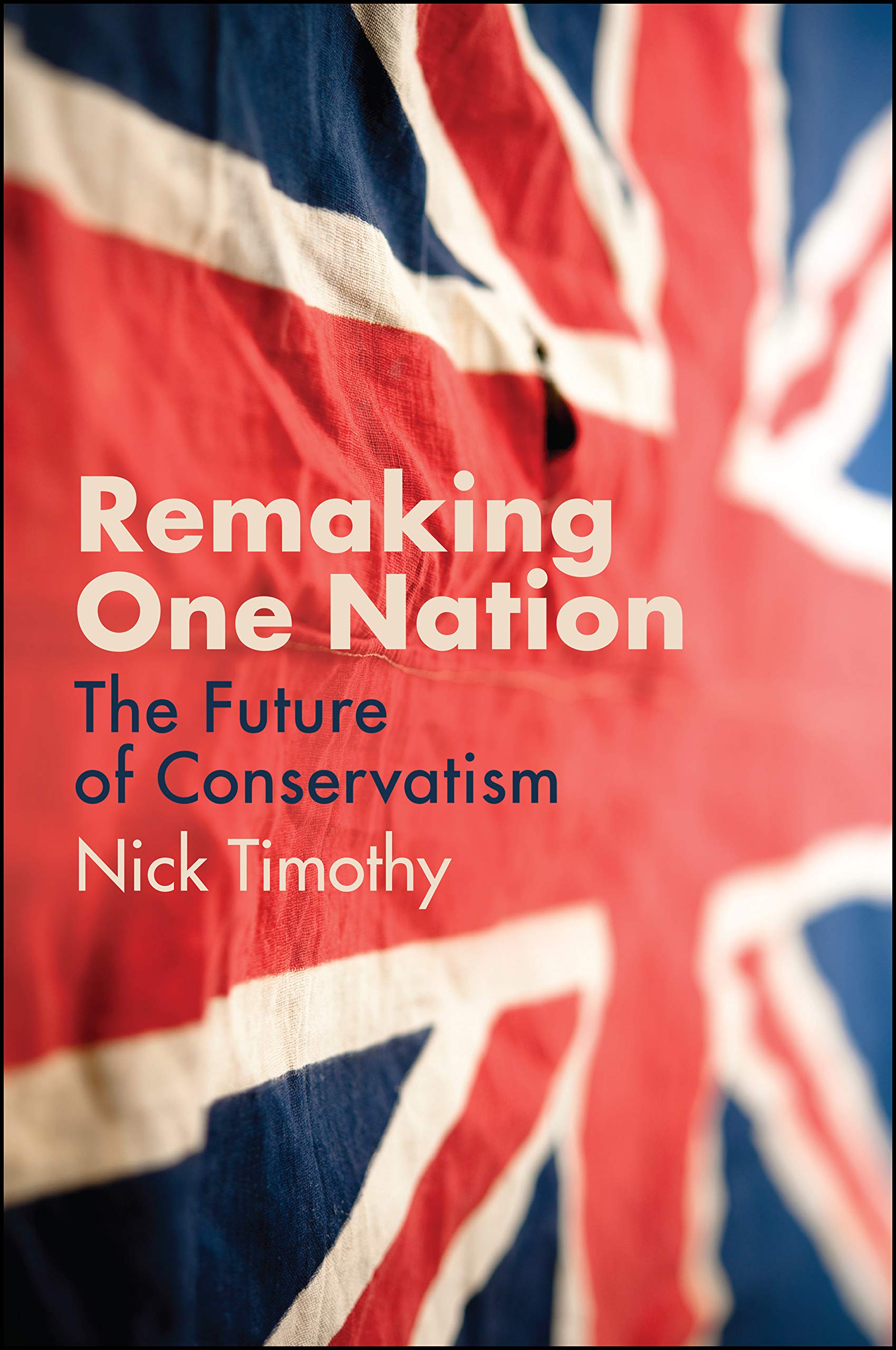
Most books that change the political weather are aimed at a centre-left audience. Remaking One Nation is unashamedly addressed from the right but not exclusively to the right. The book could not be better timed and I will argue that the majority of commentators who say the 2019 Conservative election manifesto is now dead in the water are wrong.
I don’t believe that this hideous virus is going to make it impossible for the Government to begin implementing its election manifesto. Rather, I believe that implementing the programme becomes an even more serious objective. Two political forces are crucially at work that not only open the opportunity to the Government to follow its manifesto, but make its implementation ever more important to repair the damage to the social and economic framework to this country that has resulted from this Chinese virus. Indeed, the Government’s overall election manifesto objective, of raising areas where large numbers of people have lost out, will become an integral part of the Government winning public approval that its strategy to exit the lockdown is not only workable, but intrinsically fair.
The ideas underpinning Remaking One Nation, subtitled The Future of Conservatism, could become a leading political force in the Boris era. Boris has a political record of being a One Nation Tory long before he went quietly to St Thomas’s Hospital to begin his fightback against Covid-19. A part of today’s commentariat’s daily diet is whether Boris will have experienced a Pauline conversion as he fought for his life in St Thomas’s Hospital. I doubt whether this is so, which is good news for all of us citizens who sense that he is a One Nation-builder – i.e. a Tory whose policies are essentially about building bridges rather than dividing the nation along class lines. Boris has a programme of achievements as twice-elected Mayor of London and I don’t see why we should expect any difference to his politics now he is in Downing St. If anything, his recent brush with death will reinforce his basic instincts, not change them. Boris’s record in power is, of course, different from the politics he operated to gain the premiership.
Nick Timothy’s book begins by describing the scene in the May camp just before Nick was given early news of the exit poll which showed that the 2017 election gamble had badly misfired. The Tory majority in parliament, instead of being increased, was cut so that no one party had an overall majority to work the Commons. It does not take many pages for Nick to recall the phone call he immediately had with Theresa May to tell her the news, her weeping during this conversation, and Fiona Hill, who jointly ran with Nick the No 10 operation, being quickly dispensed to Maidenhead for the Prime Minister’s local result. Not to be in Maidenhead already showed the extent to which the electorate had hidden from Tory chiefs their real intent, during the wearisome long election campaign. There is precious little written about the devastating impact that this election failure had on Nick. He merely hints at how serious he found it to cope with the post-2017 election period. He tells us, in a throwaway line, that he did not once think of suicide. This statement tells us all we need to know about how serious a blow this was to the person who had the intellectual nous and the position to draft the Tory election manifesto. The whole book is well written, but these events are recalled both beautifully and with much grace.
Nick then goes on to a discursive discussion on liberalism. I recommend that readers leave this section to the end. The book’s long-term importance, and political impact, is to be found elsewhere. In Remaking One Nation, Nick sets out in some detail what is wrong with Britain as it currently stands and what his election manifesto was attempting to achieve. What Nick writes about the underlying diseased nature of British society, and how his drafted election manifesto was intended to play out. This section has near-universal appeal. There is much consensus in our political society that survived Mrs T’s great onslaught. One of Nick’s political gifts is to write a programme that was not determined by historic party divides. And here is an attractively crafted critique to which all too many of us would willingly sign up. From this critique, Nick moves into policy and here is a political strategy that just failed in 2017. The 2017 results showed Tories nationally winning the popular vote in all classes except for the poorest. Two years later, the same strategy saw a final scaling of many of the ‘red walls’ defending so many Labour seats in the north and midlands.
Let me concentrate on one failure in the book which for me, becomes apparent when the book moves from criticism to policy. Here is my only criticism of the book, which is of the link between a pretty tough inditement of a Britain where rewards are so clearly delivered along class and party lines – and the politics of reform. Political strategists have a duty to seek those proposals which are the lynchpin in driving fundamental change. In this analysis Nick reports, that for most children, life chances are determined before the first day at school. And worse: that the following 14 years at school does not lessen overall the outcome of pupils analysed by class and income. If anything, class differences widen over the school life of pupils. It is in education that we are offered the once in a generation chance fundamentally to change the country in which we live.
The foundation years are key for children, both in what they learned at home and what that home is like. During my 40 years as an MP, for largely the same geographical area called the Birkenhead parliamentary constituency, I witnessed one change of such magnitude that is all too difficult to appear as a balanced commentator bearing witness to the truth. That objective of truth is one to which I am still committed.
During the Thatcher governments, and those of Tony Blair and Gordon Brown, Britain was opened up to globalisation and its impact was beginning to be felt quite early on. We witnessed such a mass slaughter of semi-skilled and unskilled jobs paying decent wages that, in comparison, makes Herod’s slaughter of the firstborn look like a tea party. Since the advent of globalisation, the role of males, as breadwinners, has simply been eliminated for much of the semi- and unskilled world of the male labourer. A world of too little or no work paying family wages disenfranchised males from their hunting and gathering role.
A previous social security reform paid single mothers more proportionally than two parent families claiming benefits. This well-intentioned act, plus the wipe-out of family wage jobs, is very largely responsible, I believe, for a significant rise in the numbers of children being raised in single-parent households rise out of all expectation. The changes we have witnessed were originally economically driven. Later, but not much later, this revolution in caring for children became one that was culturally driven: young women could see that there were plenty of other young women with children, ostensibly without partners or husbands, and who were making a go of it with a combination of social security payments and a wage packet.
If we are to break this cycle of intergenerational poverty with too many poor children facing make or break disadvantages that effect poor children with a lack of life chances, I believe it is actually crucial to go back to Nick’s analysis which hints at why the foundation years strategy of previous Tory, coalition and Labour governments failed. A strategy that intervenes to strengthen families must be immediate i.e. wherever possible when the baby is the womb. A strategy operated from schools of midwives and health visitors making this first link with mothers who have had a grim experience at school is, I believe, vital for any social revolution. Mothers need to be supported, and fathers when they are present, to be their child’s first teacher. Once the link has been made by such a team working from primary schools over the first two years of a child’s life, the need would then be to bring those mothers and their children into school for art, music, movement and lessons of this kind. Action to counter families not forming is crucial to the next leap forward in increasing life chances, and such a strategy must be seen as fundamental to a repositioning of education’s role in this country.
“Remaking One Nation: The Future of Conservatism” by Nick Timothy was published in 2019 by Polity Press (ISBN-13: 9781509539178). 224pp.
 Frank Field was Member of Parliament (MP) for Birkenhead from 1979 to 2019.
Frank Field was Member of Parliament (MP) for Birkenhead from 1979 to 2019.